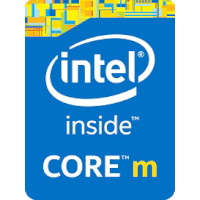Intel Core m3-7Y32
The Intel Core m3-7Y32 operates with 2 cores and 4 CPU threads. It run at 3.00 GHz base -- all cores while the TDP is set at 4.5 W.The processor is attached to the BGA 1515 CPU socket. This version includes 4.00 MB of L3 cache on one chip, supports 2 memory channels to support DDR3L-1600 SO-DIMMLPDDR3-1866 RAM and features 3.0 PCIe Gen 10 lanes. Tjunction keeps below 100 °C degrees C. In particular, Kaby Lake Y Architecture is enhanced with 14 nm technology and supports VT-x, VT-x EPT, VT-d. The product was launched on Q2/2017

| Frequency | 1.10 GHz |
| CPU Cores | 2 |
| CPU Threads | 4 |
| Turbo (1 Core) | 3.00 GHz |
| Turbo (2 Cores): | -- |
| Hyperthreading | Yes |
| Overclocking | No |
| Core Architecture | normal |
Where to Buy?
Buy Intel Core m3-7Y32
Memory & PCIe
| Memory type | DDR3L-1600 SO-DIMMLPDDR3-1866 |
| Max memory | 16 GB |
| Memory channels | 2 |
| ECC | No |
| Bandwidth | -- |
| PCIe | 3.0 x 10 |
Encryption
| AES-NI | Yes |
Internal Graphics
| Memory type | DDR3L-1600 SO-DIMMLPDDR3-1866 |
| GPU name | Intel HD Graphics 615 |
| GPU frequency | 0.30 GHz |
| GPU (Turbo) | 0.90 GHz |
| Generation | 9.5 |
| DirectX Version | 12 |
| Execution units | 24 |
| Shader | 192 |
| Max memory | 16 GB |
| Max. displays | 3 |
| Technology | 14 nm |
| Release date | Q2/2016 |
Technical details
| Instruction set (ISA) | x86-64 (64 bit) |
| Architecture | Kaby Lake Y |
| L2-Cache | -- |
| L3-Cache | 4.00 MB |
| Technology | 14 nm |
| Release date | Q2/2017 |
| Socket | BGA 1515 |
Thermal Management
| TDP (PL1) | 4.5 W |
| TDP (PL2) | -- |
| TDP Up | 7 W |
| TDP Down | 3.75 W |
| Tjunction max | 100 °C |
Cinebench R23 (Single-Core)
Cinebench R23 is the successor of Cinebench R20 and is also based on the Cinema 4 Suite. Cinema 4 is a worldwide used software to create 3D forms. The single-core test only uses one CPU core, the amount of cores or hyperthreading ability doesn't count.
Cinebench R23 (Multi-Core)
Cinebench R23 is the successor of Cinebench R20 and is also based on the Cinema 4 Suite. Cinema 4 is a worldwide used software to create 3D forms. The multi-core test involves all CPU cores and taks a big advantage of hyperthreading.
Geekbench 5, 64bit (Single-Core)
Geekbench 5 is a cross plattform benchmark that heavily uses the systems memory. A fast memory will push the result a lot. The single-core test only uses one CPU core, the amount of cores or hyperthreading ability doesn't count.
Geekbench 5, 64bit (Multi-Core)
Geekbench 5 is a cross plattform benchmark that heavily uses the systems memory. A fast memory will push the result a lot. The multi-core test involves all CPU cores and taks a big advantage of hyperthreading.
iGPU - FP32 Performance (Single-precision GFLOPS)
The theoretical computing performance of the internal graphics unit of the processor with simple accuracy (32 bit) in GFLOPS. GFLOPS indicates how many billion floating point operations the iGPU can perform per second.
Estimated results for PassMark CPU Mark
Some of the CPUs listed below have been benchmarked by CPU-Comparison. However the majority of CPUs have not been tested and the results have been estimated by a CPU-Comparison’s secret proprietary formula. As such they do not accurately reflect the actual Passmark CPU mark values and are not endorsed by PassMark Software Pty Ltd.
Cinebench R15 (Single-Core)
Cinebench R15 is the successor of Cinebench 11.5 and is also based on the Cinema 4 Suite. Cinema 4 is a worldwide used software to create 3D forms. The single-core test only uses one CPU core, the amount of cores or hyperthreading ability doesn't count.
Cinebench R15 (Multi-Core)
Cinebench R15 is the successor of Cinebench 11.5 and is also based on the Cinema 4 Suite. Cinema 4 is a worldwide used software to create 3D forms. The multi-core test involves all CPU cores and taks a big advantage of hyperthreading.
Geekbench 3, 64bit (Single-Core)
Geekbench 3 is a cross plattform benchmark that heavily uses the systems memory. A fast memory will push the result a lot. The single-core test only uses one CPU core, the amount of cores or hyperthreading ability doesn't count.
Geekbench 3, 64bit (Multi-Core)
Geekbench 3 is a cross plattform benchmark that heavily uses the systems memory. A fast memory will push the result a lot. The multi-core test involves all CPU cores and taks a big advantage of hyperthreading.


